医护英语 Unit1
- 格式:ppt
- 大小:7.08 MB
- 文档页数:67
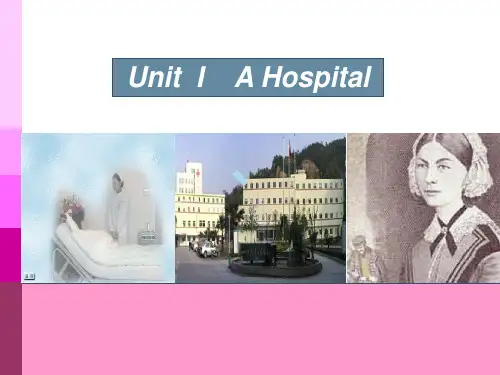
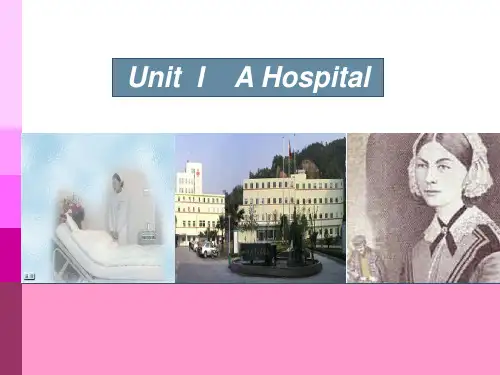
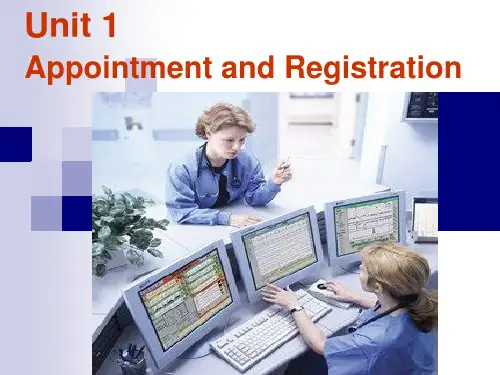
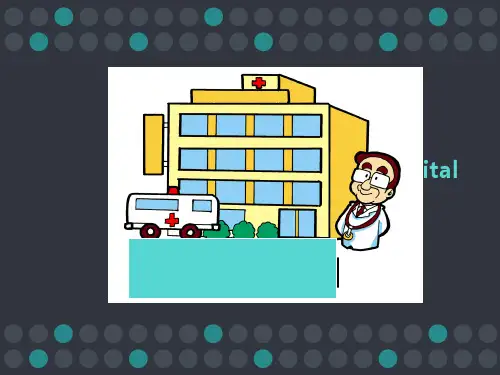

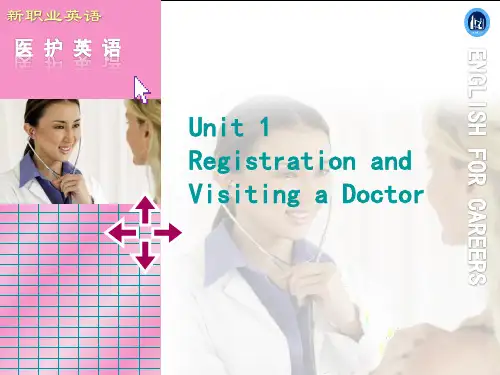
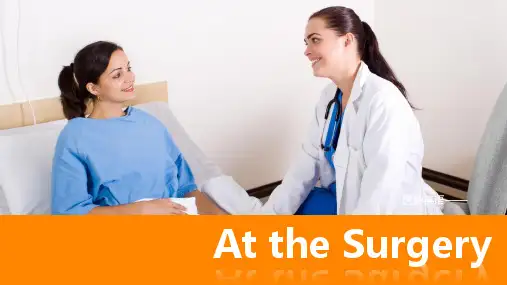
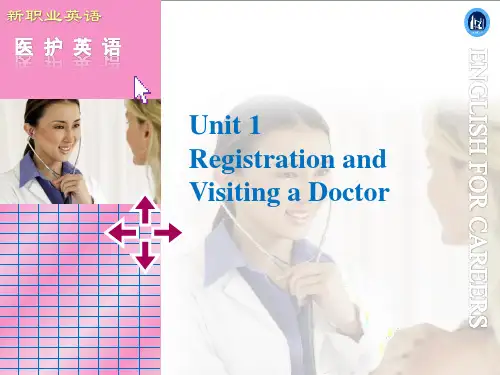
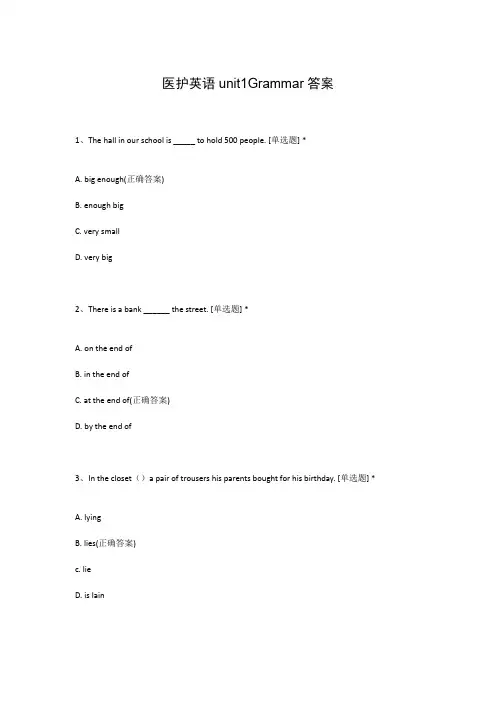
医护英语unit1Grammar答案1、The hall in our school is _____ to hold 500 people. [单选题] *A. big enough(正确答案)B. enough bigC. very smallD. very big2、There is a bank ______ the street. [单选题] *A. on the end ofB. in the end ofC. at the end of(正确答案)D. by the end of3、In the closet()a pair of trousers his parents bought for his birthday. [单选题] *A. lyingB. lies(正确答案)c. lieD. is lain4、John had planned to leave but he decided to stay in the hotel for _____ two days because of the heavy rain. [单选题] *A. otherB. another(正确答案)C. the otherD. others5、What surprised me ______ was that he succeeded. [单选题] *A. most(正确答案)B. mostlyC. almostD. at most6、Chinese is one of ____ most widely used languages in ____ world. [单选题] *A. a, theB. /, theC. the, the(正确答案)D. a, /7、—When are you going to Hainan Island for a holiday? —______ the morning of 1st May.()[单选题] *A. InB. AtC. On(正确答案)D. For8、Guilin is _______ its beautiful scenery. [单选题] *A. famous for(正确答案)B. interested inC. fond ofD. careful with9、The rain is very heavy _______ we have to stay at home. [单选题] *A. butB. becauseC. so(正确答案)D. and10、It was _____ that the policy of reform and opening up came into being in China. [单选题] *A. in the 1970s(正确答案)B. in 1970sC. in the 1970s'D. in 1970's11、I’m so tired after _______ walk. [单选题] *A. three hour’sB. three hours’(正确答案)C. three hoursD. three hour12、A survey of the opinions of students()that they admit several hours of sitting in front of the computer harmful to health. [单选题] *A. show;areB. shows ;is(正确答案)C.show;isD.shows ;are13、Once you get on the road, here are some traffic _______ to remember. [单选题] *A. problemsB. positionsC. rules(正确答案)D. points14、Can you tell me how the accident _______? [单选题] *A. came about(正确答案)B. came backC. came downD. came from15、Don’t forget _______ those books when you are free. [单选题] *A. to read(正确答案)B. readingC. readD. to reading16、--Jimmy, you are supposed to?_______ your toys now.--Yes, mom. [单选题] *A. put upB. put onC. put away(正确答案)D. put down17、The managing director took the()for the accident, although it was not his fault. [单选题] *A. GuiltB. charge(正确答案)C. blameD. accusation18、28.—Where is Fujian Province?—It’s ________ the southeast of China. [单选题] * A.in (正确答案)B.onC.toD.at19、The old woman doesn’t feel _______ though she lives _______. [单选题] *A. alone; lonelyB. alone; aloneC. lonely; lonelyD. lonely; alone(正确答案)20、Lily is a very_____person and never wastes anything. [单选题] *A.generousB.economical(正确答案)C.economicD.efficient21、—These shoes look cool. ______ are they?—They are on sale, only $()[单选题] *A. How much(正确答案)B. How longC. How manyD. How soon22、36.This kind of bread is terrible. I don't want to eat it ______. [单选题] *A.any more(正确答案)B.some moreC.no longerD.some longer23、35.Everyone in China ______ Mid-Autumn Day. [单选题] *A.likes(正确答案)B.likeC.is likingD.are like24、82.—Is there a bookshop near here?—Yes. Walk ________ the road for five minutes andyou'll see one near a big tree. [单选题] *A.toB.along(正确答案)C.ofD.about25、My camera is lost. I am ______ it everywhere.()[单选题] *A. looking atB. looking for(正确答案)C. looking overD. looking after26、—How do you find()birthday party of the Blairs? —I should say it was __________ complete failure.[单选题] *A.a; aB. the ; a(正确答案)C.a; /D.the; /27、--_______ does Ben go to school?--By bus. [单选题] *A. How(正确答案)B. WhatC. WhereD. Why28、()late for the meeting again, Jack! 一Sorry, I won t. [单选题] *A.Don’tB. Be notC.Don't be(正确答案)D.Not be29、31.That's ______ interesting football game. We are all excited. [单选题] * A.aB.an(正确答案)C.theD./30、I will _______ from Hunan University next year. [单选题] *A. learnB. studyC. graduate(正确答案)D. come。
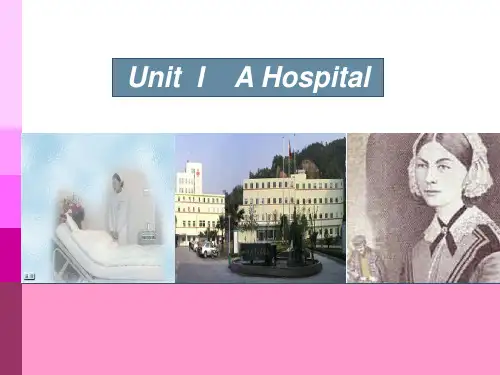
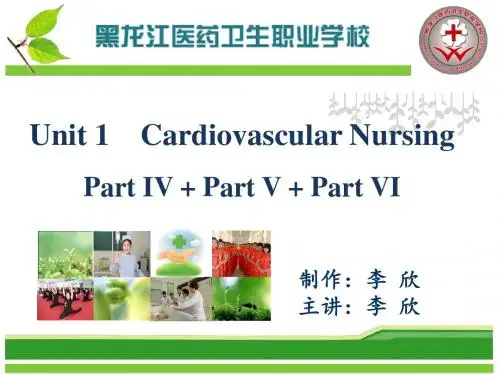
医护英语unit1答案1、I hope to see you again _______. [单选题] *A. long long agoB. long beforeC. before long(正确答案)D. long2、--What are the young people doing there?--They are discussing how to _______?the pollution in the river. [单选题] *A. come up withB. talk withC. deal with(正确答案)D. get on with3、Was()that I saw last night at the concert? [单选题] *A. it you(正确答案)B. not youC. youD. that yourself4、_____from far away, the 600-meter tower is stretching into the sky. [单选题] *A. SeeB. SeeingC. To seeD. Seen(正确答案)5、This is not our house. lt belongs to _____. [单选题] *A. the Turners'B. the Turners(正确答案)C. Turner'sD. Turners6、If you know the answer, _______ your hand, please. [单选题] *A. put up(正确答案)B. put downC. put onD. put in7、The famous writer, _____ writings for China Daily I appreciate a lot , is invited to give a speech in our university. [单选题] *A. thatB. whose(正确答案)C. whomD. who8、Mr. Brown ______ the football match next week.()[单选题] *A. is seeingB. seesC. sawD. is going to see(正确答案)9、More than one student_____absent from the class yesterday due to the flu. [单选题] *A.areB.hasC.isD.was(正确答案)10、I repeated my question several times. [单选题] *A. 到达B. 惊奇C. 重复(正确答案)D. 返回11、--_______ I borrow these magazines?--Sorry, only the magazines over there can be borrowed. [单选题] *A. MustB. WouldC. May(正确答案)D. Need12、We should _______ a hotel before we travel. [单选题] *A. book(正确答案)B. liveC. stayD. have13、_______ your help, I can’t finish my job. [单选题] *A. withB. without(正确答案)C. inD. into14、27.Will it ______ warm in the room? [单选题] *A.areB.be(正确答案)C.isD.going to be15、Jack would rather spend time complaining than_____the problem by himself. [单选题] *A.solve(正确答案)B.solvedC.solvesD.to solve16、Since the war their country has taken many important steps to improve its economic situation. [单选题] *A. 制定B. 提出C. 讨论D. 采取(正确答案)17、He couldn’t ______ the maths problem without your help. [单选题] *A. work out(正确答案)B. work atC. work forD. work with18、30.I want to find ______ and make much money. [单选题] *A.worksB.jobC.a job(正确答案)D.a work19、Nearly everything they study at school has some practical use in their life, but is that the only reason _____ they go to school? [单选题] *A. why(正确答案)B. whichC. becauseD. what20、It seems slow for children to become _____ ,while adults often feel time flies. [单选题] *A. growns-upsB. growns-upC. grown upsD. grown-ups(正确答案)21、Miss Smith is a friend of _____. [单选题] *A. Jack’s sister’s(正确答案)B. Jack’s sisterC. Jack sister’sD. Jack sister22、Mom is making dinner. It _______ so nice! [单选题] *A. smells(正确答案)B. tastesC. feelsD. sounds23、The Spring Festival is on the way.Many shops have _______ huge posters with the word sales. [单选题] *A. put up(正确答案)B. put onC. put outD. put off24、61.How is online shopping changing our way? ? ? ? ? ? life? [单选题] *A.of(正确答案)B.inC.onD.for25、I didn't hear _____ because there was too much noise where I was sitting. [单选题] *A. what did he sayB. what he had said(正确答案)C. what he was sayingD. what to say26、You can't see many _____ in a hospital. [单选题] *A. man nurseB. men nurses(正确答案)C. men nurseD. man nurses27、1.I saw ________ action film with my friend yesterday, and ________ film was amazing. [单选题] *A.a...aB.a...theC.an...the(正确答案)D.an...a28、______ pocket money did you get when you were a child? ()[单选题] *A. WhatB. HowC. How manyD. How much(正确答案)29、69.Online shopping is easy, but ________ in the supermarket usually ________ a lot of time. [单选题] *A.shop; takesB.shopping; takeC.shop; takeD.shopping; takes(正确答案)30、_____ the project, we'll have to work two more weeks. [单选题] *A. CompletingB. CompleteC. Having completedD.To complete(正确答案)。
医护英语unit1作文范文英文回答:In Unit 1 of medical English, we delve into various aspects of healthcare communication. Effective communication is essential in the medical field, not only between healthcare professionals but also between healthcare providers and patients. In this essay, I will discuss the importance of effective communication, its challenges, and strategies to overcome them.Effective communication in healthcare ensures that information is accurately exchanged between healthcare providers and patients. It involves not only verbal communication but also non-verbal cues such as body language and gestures. For instance, when explaining a diagnosis to a patient, it's crucial to use clear language, avoid medical jargon, and provide visual aids if necessary. This ensures that the patient fully understands their condition and the treatment plan.However, there are challenges in achieving effective communication in healthcare. One common challenge is language barriers, especially in multicultural societies where patients may speak different languages. For example, imagine a scenario where a doctor needs to communicate with a patient who speaks a different language. In such cases, interpreters or translation services may be needed to facilitate communication and ensure that important medical information is accurately conveyed.Another challenge is the emotional aspect of communication, particularly when delivering bad news or discussing sensitive topics. Empathy and active listening play a crucial role in such situations. For example, when informing a patient about a serious illness, it's essential to show empathy and offer support. Simply saying, "I understand this news may be difficult to process, but I'm here to support you through this journey," can make a significant difference in how the patient perceives the information.To overcome these challenges, healthcare professionals can employ various communication strategies. One such strategy is the use of plain language and simple explanations to ensure that patients understand medical information. Additionally, cultural competence training can help healthcare providers understand the cultural beliefs and practices of their patients, enabling them to communicate more effectively across cultural boundaries.Moreover, active listening skills are paramount in healthcare communication. Patients should feel heard and understood by their healthcare providers. Reflective listening techniques, such as paraphrasing and summarizing, can demonstrate to patients that their concerns are being acknowledged and understood.In conclusion, effective communication is vital in healthcare for ensuring patient safety, satisfaction, and overall quality of care. Despite the challenges, healthcare providers can employ various strategies to overcome communication barriers and foster meaningful connections with their patients.中文回答:在医护英语的第一单元中,我们深入探讨了医疗保健沟通的各个方面。
医护英语书电子版unit1作文范文范文模板As a template for the essay in Unit 1 of the electronic version of the medical English book, we could start by introducing the fundamental concepts covered in this unit.In this essay, we will explore the significance ofeffective communication in healthcare settings. Communication plays a pivotal role in ensuring patient safety, delivering quality care, and fostering positive relationships between healthcare professionals and patients. Effective communication encompasses verbal and non-verbal skills, active listening, empathy, and cultural competence.In the healthcare sector, clear and concise communicationis essential for accurate diagnosis, treatment planning,and medication administration. Miscommunication or misunderstanding can lead to medical errors, jeopardizing patient safety and well-being. Therefore, healthcare professionals must possess strong communication skills to convey information accurately and comprehensively.Moreover, effective communication promotes patient satisfaction and trust. Patients feel more comfortable and reassured when healthcare providers communicate clearly, listen attentively to their concerns, and involve them in decision-making processes regarding their care. Thispatient-centered approach enhances the overall healthcare experience and improves treatment outcomes.Furthermore, effective communication is crucial for interprofessional collaboration within healthcare teams. Clear communication among physicians, nurses, pharmacists, and other allied health professionals ensures seamless coordination of care and promotes interdisciplinary problem-solving. By sharing information openly and transparently, healthcare teams can optimize patient outcomes and minimize medical errors.In addition to verbal communication, non-verbal cues such as body language, facial expressions, and gestures also play a significant role in conveying messages in healthcare settings. Healthcare professionals must be mindful of their non-verbal communication to maintain professionalism, buildrapport with patients, and demonstrate empathy and understanding.Cultural competence is another essential aspect ofeffective communication in healthcare. Recognizing and respecting cultural differences in communication styles, beliefs, and healthcare practices is vital for delivering culturally sensitive care. By understanding the cultural backgrounds of patients, healthcare providers can tailor their communication approaches to meet the unique needs and preferences of diverse populations.In conclusion, effective communication is paramount in healthcare settings for ensuring patient safety, promoting positive patient experiences, facilitatinginterprofessional collaboration, and delivering culturally competent care. Healthcare professionals must continuously hone their communication skills to meet the evolving needs of patients and enhance the quality of care delivery. By prioritizing effective communication, healthcare organizations can achieve better patient outcomes and improve overall healthcare delivery.。
医护英语u1 Listening Task 1答案1、The reason I didn't attend the lecture was simply _____ I got a bad cold that day. [单选题] *A. becauseB. asC. that(正确答案)D. for2、In fact, Beethoven did something brave than dying. [单选题] *A. 勇敢(正确答案)B. 冒险C. 可怕D. 奇妙3、—______ do you pay for it? —Over the Internet. ()[单选题] *A. WhatB. How muchC. How(正确答案)D. When4、Could you tell me _____ to fly from Chicago to New York? [单选题] *A.it costs how muchB. how much does it costC. how much costs itD.how much it costs(正确答案)5、I’m not sure whether we’ll go on ______ foot or by _____ bike? [单选题] *A. the; theB. /; theC. /; /(正确答案)D. the; /6、He asked for help from his friends who owned a computer company in New York. [单选题] *A. 拥有(正确答案)B. 经营C. 工作D. 了解7、-----How can I apply for an online course?------Just fill out this form and we _____ what we can do for you. [单选题] *A. seeB. are seeingC. have seenD. will see(正确答案)8、I don't know the man _____ you are talking about. [单选题] *A. who'sB. whose(正确答案)C. whomD. which9、—Can you play tennis?—______. But I can play basketball.()[单选题] *A. Yes, I canB. Yes, I doC. No. I can’t(正确答案)D. No, I don’t10、——Can you come on Monday or Tuesday? ——Im afraid()of them is possible. [单选题] *A.neither(正确答案)B. eitherC. noneD.both11、We are living in an age()many things are done by computer. [单选题] *A. thatB. whichC. whyD. when(正确答案)12、Last year Polly _______ an English club and has improved her English a lot. [单选题] *A. leftB. sawC. joined(正确答案)D. heard13、The weather forecast says that we’ll have occasional rain tomorrow. [单选题] *A. 偶尔的B. 不停的C. 少量的(正确答案)D. 不可预测的14、19.Students will have computers on their desks ________ . [单选题] *A.in the future(正确答案)B.on the futureC.at the momentD.in the past15、—Tony, it’s cold outside. ______ wear a jacket?—OK, mom.()[单选题] *A. Why not(正确答案)B. Why don’tC. Why did youD. Why do you16、The paper gives a detailed()of how to create human embryos (胚胎)by cloning. [单选题] *A. intentionB. description(正确答案)C. affectionD. effort17、Grandfather lives with us. We all _______ him when he gets ill. [单选题] *A. look after(正确答案)B. look atC. look forD. look like18、How I wish I()to repair the watch! I only made it worse. [单选题] *A. had triedB. hadn't tried(正确答案)C. have triedD.didn't try19、I often _______ music from the Internet. [单选题] *A. download(正确答案)B. spendC. saveD. read20、Look at those black clouds! Take ______ umbrella or ______ raincoat with you. ()[单选题] *A. a; anB. an; a(正确答案)C. an; anD. a; a21、You needn’t _______ me. I’m old enough to take care of myself. [单选题] *A. worry about(正确答案)B. write downC. put awayD. wake up22、This kind of work _______ skills and speed. [单选题] *A. looks forB. waits forC. calls for(正确答案)D. cares for23、The manager was quite satisfied with his job. [单选题] *A. 担心的B. 满意的(正确答案)C. 高兴的D. 放心的24、It’s raining outside. Take an _______ with you. [单选题] *A. cashB. life ringC. cameraD. umbrella(正确答案)25、The trouble turned out to have nothing to do with them. [单选题] *A. 由…引发的B. 与…有牵连C. 给…带来麻烦D. 与…不相干(正确答案)26、The book is very _______. I’ve read it twice. [单选题] *A. interestB. interestedC. interesting(正确答案)D. interests27、If you want to be successful one day, you have to seize every _______ to realize your dream. [单选题] *A. changeB. chance(正确答案)C. chairD. check28、There are many_____desks in the room. [单选题] *rge old brown(正确答案)B.old large brownrge brown oldD.brown old large29、My dog is very _______. It is safe to touch it if you want to. [单选题] *A. luckyB. deliciousC. friendly(正确答案)D. helpful30、_______ your help, I passed the English exam. [单选题] *A. ThanksB. Thanks to(正确答案)C. Thank youD. Thank to。